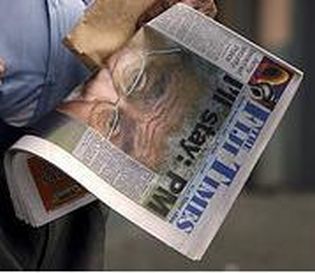
Publisher:
Bonnie King
CONTACT:
Newsroom@Salem-news.com
Advertising:
Adsales@Salem-news.com

~Truth~
~Justice~
~Peace~
TJP
Jul-07-2010 20:07

 TweetFollow @OregonNews
TweetFollow @OregonNews
New Press Law Gives Sweeping Powers to Fiji's Military
Salem-News.comThe decree also includes repressive, even bizarre, demands that add great difficulty to journalists' day-to-day jobs.
 The Fiji Times Courtesy: Reuters via ABC News |
(SUVA, Fiji) - New media legislation in Fiji permits government-appointed officials to arbitrarily seize media equipment and documents, force journalists to reveal their sources and fine media organisations up to $100,000 Fiji Dollars (around US $53,000), report the Pacific Islands News Association (PINA), Pacific Freedom Forum (PFF), Reporters Without Borders (RSF) and other IFEX members.
The Media Industry Development Decree, passed on 28 June, could also force Fiji's oldest and most critical newspaper, Australian-owned "The Fiji Times," to close. The decree retroactively applies a rule that 90 percent of a media company must be locally owned and companies have only a three-month period in which to comply.
The "Fiji Times," founded in 1869, has attempted to maintain its independence despite "emergency" measures imposed in April 2009 that banned critical reporting. For example, the newspaper has been harshly censured by government officials for its refusal to run government press releases "as is," according to "The Australian". In an open letter to Prime Minister Frank Bainimarama, RSF suggests the ownership requirement was drafted "specifically to punish a publication that is considered overly 'negative.'" PINA expressed concern for the newspaper's 200 employees and had been encouraging authorities to engage in dialogue with the "Fiji Times" over the ownership requirement before the legislation was passed.
Since the Public Emergency Regulations were passed in 2009, government censors have visited broadcasting stations and newspaper offices on a daily basis to vet the news and cut out any story that could offend the military regime of Commodore Bainimarama. The measures were put into force shortly after the 2006 coup was declared unlawful by the Fiji Court of Appeal.
While the Bainimarama government says the emergency powers will be dropped, IFEX members and critics argue the decree entrenches much of the government's "temporary" control over the media into permanent law. The decree has additionally been condemned by Australian Foreign Minister Stephen Smith, New Zealand Prime Minister John Key and the Pacific Area Newspaper Publishers Association.
Under the law, six tribunal officers directly appointed by the regime of military leader Frank Bainimarama get to decide when a news article or broadcast is "against the national interest" or "creates communal discord." Decisions made by the tribunal are only subject to appeal in cases that involve fines of $100,000 Fiji Dollars.
The decree also includes repressive, even bizarre, demands that add great difficulty to journalists' day-to-day jobs. For example, journalists are now legally obliged to tell a source who else they are interviewing for an article, even though reporters often only decide which sources to approach as a story develops. Members of the media will also face difficulty protecting their sources, as journalists who do not give anonymous sources' names to authorities can now be jailed for up to two years.
PPF chair Susuve Laumaea said the new decree "is really about doing away with watchdogs." He added the military regime "will now monitor and control who says what in Fiji's media through a new structure."
PPF co-chair Monica Miller added that "the punitive language of enforcement against media outlets and journalists who refuse to cooperate takes away from any benefits the decree drafters had in mind" and that the threat of steep and swift punishment imposed by the legislation will lead journalists to self censor.
Source: IFEX - International Freedom of Expression eXchange: The global network for free expression
Articles for July 6, 2010 | Articles for July 7, 2010 | Articles for July 8, 2010
Quick Links
DINING
Willamette UniversityGoudy Commons Cafe
Dine on the Queen
Willamette Queen Sternwheeler
MUST SEE SALEM
Oregon Capitol ToursCapitol History Gateway
Willamette River Ride
Willamette Queen Sternwheeler
Historic Home Tours:
Deepwood Museum
The Bush House
Gaiety Hollow Garden
AUCTIONS - APPRAISALS
Auction Masters & AppraisalsCONSTRUCTION SERVICES
Roofing and ContractingSheridan, Ore.
ONLINE SHOPPING
Special Occasion DressesAdvertise with Salem-News
Contact:AdSales@Salem-News.com

googlec507860f6901db00.html



Terms of Service | Privacy Policy
All comments and messages are approved by people and self promotional links or unacceptable comments are denied.
[Return to Top]
©2025 Salem-News.com. All opinions expressed in this article are those of the author and do not necessarily reflect those of Salem-News.com.